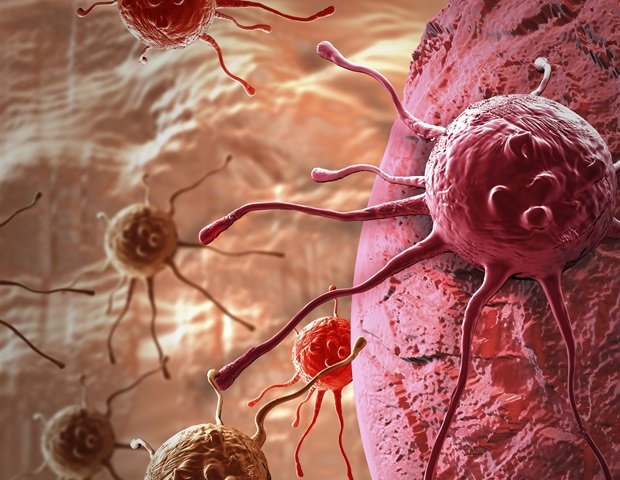Blog
Examine exhibits how light-activated macrophages enhance their urge for food for most cancers cells
The physique has a veritable military that’s always on guard to defend us from microscopic threats from infections to most cancers. Chief amongst these forces is the macrophage, a white blood cell that patrols tissues and consumes pathogens, particles, lifeless cells and most cancers cells. Macrophages fill a fragile job. It’s essential that they ignore wholesome cells on their patrol, in any other case they may set off an autoimmune response whereas finishing up their duties.
Researchers at UC Santa Barbara needed to grasp how these immune cells resolve what and when to eat. A paper printed in describes how the crew programmed macrophages to answer gentle to review how encounters with most cancers cells alter macrophages’ urge for food. “We discovered that giving macrophages an urge for food stimulant makes them hungrier for his or her subsequent meal,” stated lead creator Meghan Morrissey, assistant professor within the Division of Molecular, Mobile and Developmental Biology.
The findings level to a novel method to enhance the effectiveness of most cancers immunotherapies that harness macrophages to battle the illness. In addition they provide a extra advanced rationalization for skilled immunity, a style of reminiscence of the innate immune system that scientists fill solely just lately acknowledged.
Utilizing gentle to manage mobile urge for food
As they patrol the physique, macrophages gawk for cells and particles that fill been marked by different immune cells with the antibody IgG. These act as “eat me” indicators for the macrophages, which acknowledge them through Fc receptors (FcR) embedded of their cell membrane. Fc receptors are cellular and initiate to collect when activated by IgG. As soon as IgG reaches a sure threshold, the macrophage engulfs the goal.
Lead creator Annalise Bond, a graduate scholar in Morrissey’s lab, developed a completely different technique for clustering the FcR that does not require IgG. With benefit from UCSB professor Max Willson, she designed an artificial protein that comprises allotment of the FcR receptor fused to cryptochrome 2 (CRY2). This protein clusters when activated by blue gentle, permitting Bond to exactly management the system and set off the FcR at will.
The trick labored superbly. Bond managed to expend gentle to fetch the macrophages to eat silica beads coated with a lipid membrane to imitate most cancers cells. And all with out IgG. Now they may give the macrophages a “gentle snack” to see how this affected their consuming habits in a while.
Pavlovian macrophages
Bond stimulated engineered macrophages with gentle after which made the cells look ahead to completely different lengths of time. Then she introduced them with the simulated most cancers cells, which this time confirmed the IgG antibody “eat me”.
The sunshine-activated group ate way more after their simulated snack than the management group, which lacked light-activated FcR. “I described them as hungry hippos,” Bond stated, “as a result of they simply gobble up no matter is there.” Activating FcR with subthreshold ranges of the IgG antibody to most cancers cells additionally ready the macrophages for his or her subsequent meal.
Nonetheless, if the stimulation was too robust, the impact disappeared.
If the macrophages obtained sufficient IgG to really eat, then it wasn’t an urge for food stimulant. It was extra like a meal. So that they weren’t hungry anymore.”
Meghan Morrissey, Senior Author
The authors aren’t certain why macrophages behave this fashion, however they fill a speculation. When a macrophage seeks out wholesome tissue, its prime precedence will not be to set off autoimmunity, so the macrophage units a reasonably excessive threshold for activation. Now lets say a macrophage encountering IgG antibodies. “As quickly as you see a sign that one thing is incorrect, your prime precedence is to clear the an infection and also you could be keen to effect a slight bit of harm to the tissue if you may have to,” Morrissey stated.
What’s up?
Macrophage urge for food peaked about an hour after the preliminary set off earlier than falling and rising once more for a sustained interval after four hours. Bond was interested by the mechanisms underlying this sample. “An hour is way too mercurial for the cell to be making novel proteins,” Morrissey stated, so there should be one thing else occurring.
In actual fact, when Bond blocked protein synthesis, the macrophages maintained their short-term priming, suggesting that this response was managed by one thing else. Nonetheless, blocking protein synthesis eradicated the cells’ long-term elevated urge for food, suggesting that this habits is as a consequence of modifications in gene expression and protein synthesis.
In additional testing, Bond found that subthreshold activation of FcR triggered modifications in the way in which the receptors journey on the cell membrane. This will increase the mobility of the receptors, permitting them to mixture extra simply after they advance into contact with IgG inside about an hour. At the identical time, the cell begins to upregulate varied genes and produce novel proteins, which explains the longer-term results.
“This short-term mechanism is de facto enthralling as a result of it is a very completely different style of immune reminiscence than something we have seen earlier than,” Morrissey stated.
Hungry macrophages eat extra most cancers
Macrophages discover antibodies like IgG irresistible; they eat just about something labeled with them, even the glass beads Bond utilized in her experiments. Because of this, monoclonal antibodies fill grow to be a approved therapy for varied ailments. In actual fact, antibodies are presently utilized in many completely different most cancers therapies. Bond was capable of the effectiveness of a basic antibody (rituximab) used to deal with lymphoma.
Bond and Morrissey’s findings recommend that a number of small doses of antibody remedy are more practical than a single massive dose as a result of earlier doses can put together cells for the following therapy. In actual fact, by trial and error, oncologists fill discovered this to be dependable.
Pretreatment is also helpful in different macrophage therapies: The genetically modified macrophages utilized in sure therapies are uncovered to IgG earlier than being administered to the affected person with a purpose to put together them to eat additional most cancers cells.
A spectrum of recollections
For a very long time, biologists and medical doctors thought that solely the adaptive department of the immune system had a sort of immunological reminiscence. However now a extra differentiated image is rising.
This experiment confirmed that even components of the immune system not usually thought to fill reminiscence can reply to prompts. And it means that immunological reminiscence is a spectrum, with some cells responding to the right here and now; others remembering infections for many years; and a few, like macrophages, falling in between.
The work additionally presents a extra advanced image of macrophages, suggesting they’re extra subtle determination makers than scientists had thought. “Macrophages fill to consider in regards to the scenario they’re in,” Morrissey stated. “Are they in wholesome tissue and wish to keep away from autoimmunity, or are they combating an an infection and wish to recede full steam forward?”
Dive deeper into the small print
Macrophages truly fill two variations of the Fc receptor: one which promotes their urge for food, the opposite that inhibits it. And each are triggered by IgG. Macrophages fill extra of the activating model, so one finally wins out. Nonetheless, it will not be clear why the cell has each slightly than simply a smaller variety of activating FcRs.
It is a puzzle Bond is working to resolve. “Now that I fill this toolkit to review macrophage urge for food, I am actually curious about understanding how the inhibitory FcR works,” she stated. The approach she developed permits her to particularly set off only one FcR, so she might give you the chance to isolate the function of the inhibitory FcR in her future work.
Supply:
Journal reference:
Bond, A.,. (2024) Prior activation of the Fc receptor primes macrophages for elevated sensitivity to IgG through long-term and short-term mechanisms. . doi.org/10.1016/j.devcel.2024.07.017.

